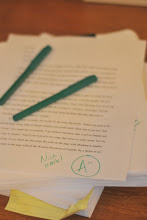I'm sitting here helping my 2nd grade daughter with her homework.
She is to complete three story maps, each on a book from her shelves here at home that she has read and knows well. This task has paralyzed her.
And that's what I find fascinating.
With as natural as stories are to us as human beings, how is it that a task to map out a story paralyzes my child? How is it that identifying the characters, the setting, the problem/solution, and the important plot details is making my child believe that she is unable to succeed?
Normally my child whips through her homework. But tonight, she had to take a five minute break under a blanket on the couch. Now that she's been back at the table she has written down three plot details in about 15 minutes. Not the usual pace for a kid who can complete a week's worth of homework math story problems in about a half hour.
She's sitting next to me, whiny, doodling on her page. "What happens next in the story?" I ask her.
"I don't know. I forgot," she says very sadly. "You told me but I don't remember."
We had just read the story together. Surely she has not forgotten the details of the story yet?
"What if there's a right and wrong?" she asks me. "My teacher writes A LOT when we do these at school. We copy down what she writes on the board."
"Are you worried that you aren't writing enough?" I ask.
She finishes with another plot detail and asks me what's next. She has just flipped through the book again but asks ME what's next. She asks me to write it even. Or at least to tell her what to write. When I make a suggestion, she tells me that it's too long, too many words (this from a child who has handwritten several pages of her autobiography in one sitting, a child who read about eight Magic Treehouse house books in one weekend and has no problem with stories).
I worry that already school is teaching her that there is only one set of right answers about a story. I worry that already she is learning that what the teacher says about a book is right and her job is just to copy it down neatly on her story map. I worry that she is learning already that the purpose of reading a story in school is just to identify its parts and pieces, not to say what she thinks about a story.
I ask her if she would rather write about what she thinks about the story. She says the story map never asks her to do that.
I ask her why she picked the book she used for the first story map--and she said it was because it was short and she thought it would be easy to work with.
Oh my. Already? Choosing a book for a school task because it's short? How did this happen?
I'm certain her teacher means well and does not intend for any of this to happen. In fact, I have been quite impressed by what I know of my daughter's classroom. I know that the literacy approaches taken there are all informed by researched best practice.
But it's absolutely fascinating to see my child struggling already with a task in school that boils a book down to its mere components, separated from pondering what the story has to say about our life as human beings. She's so worried about not writing enough and not writing the right details that she's paralyzed.
Well, we just agreed she could have some chocolate if she finished another story map... now she's somewhat more motivated. Good in the short term for getting the homework done. Bad in the long term for her love of reading?
No wonder so many of my high school students aren't readers.
Signing off--
M. Shelley
Subscribe to:
Post Comments (Atom)


No comments:
Post a Comment